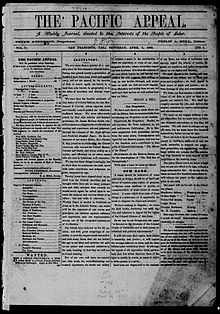Pacific Appeal
 From Wikipedia the free encyclopedia
From Wikipedia the free encyclopedia

Pacific Appeal was an African-American newspaper based in San Francisco and published from April 1862 to June 1880.[1][2][3][4]
History[edit]
Pacific Appeal was co-founded by Philip Alexander Bell, an African-American civil rights and antislavery activist who had established Weekly Advocate (edited by Samuel Cornish) and worked for William Lloyd Garrison's Liberator,[4] and Peter Anderson, a San Francisco civil rights activist and delegate at the California Colored Citizens Convention.[5] It was the successor to the Mirror of the Times, another San Francisco-based African-American newspaper that had been established in 1855,[3] with the change of name occurring along with a change of proprietor from Judge Mifflin W. Gibbs[6]: 76 [7]: 8 to William H. Carter.[6]: 91 Its contemporaries at the time included the Anglo-African, and it was regarded as the official organ of African-Americans on the Pacific slope.[6]: 91
The paper’s motto was “He who would be free, himself must strike the blow.”[6]: 92 [3] It began publishing in April 1862.[1][2]
Later, Bell and Anderson would split, with Bell accusing Anderson of becoming less antislavery and more accommodationist.[3]
External coverage[edit]
The coverage of antislavery and civil rights issues in the first few years has been covered by historians and chroniclers of black abolitionism of the era, including in The Afro-American Press and Its Editors.[6]: 92 [8][3]
Notable content[edit]
The inaugural 1862 volume contained eight antislavery poems, including four poems by San Francisco poet James Madison Bell, writing under the initials JMB.[3]
Pacific Appeal also published some 250 proclamations by Emperor Norton, self-proclaimed Emperor of the United States, including his proposals for what would later become the San Francisco–Oakland Bay Bridge and the Transbay Tube.[9][10][11][12]
See also[edit]
References[edit]
- ^ a b "The Pacific Appeal". Internet Archive. April 1862. Retrieved September 7, 2017.
- ^ a b "About The Pacific appeal. volume (San Francisco, Cal.) 1862-188?". Library of Congress. Retrieved September 7, 2017.
- ^ a b c d e f "Pacific Appeal Antislavery Poetry (1862)". Retrieved September 7, 2017.
- ^ a b "Bell, Philip Alexander (1808-1889)". BlackPast.org. 30 January 2007. Retrieved September 7, 2017.
- ^ "Anderson, Peter (c.1822-1879)". BlackPast.org. 12 February 2007. Retrieved September 7, 2017.
- ^ a b c d e Penn, Irvine Garland (1891). The Afro-American Press and Its Editors. Retrieved September 7, 2017.
- ^ George William Gore (1922). Negro Journalism: An Essay on the History and Present Conditions of the Negro. University Microfilms. Retrieved September 7, 2017.
- ^ "Black Abolitionist Papers: Front Matter from A Guide to the Microfilm Collection". Retrieved September 7, 2017.
- ^ "Bridge Proclamations", The Emperor Norton Trust
- ^ Emperor Norton (January 6, 1872). "Emperor Norton Bridge Proclamation I". Pacific Appeal. Retrieved June 3, 2017.
- ^ Emperor Norton (March 23, 1872). "Emperor Norton Second Bridge Proclamation". Pacific Appeal. Retrieved June 3, 2017.
- ^ Emperor Norton. "Emperor Norton Transbay Tube Declaration". Pacific Appeal.